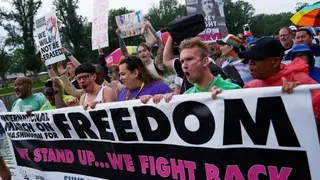September 18, 2009
EU Strongly Condemns Lithuania's New Anti-Gay Law
Kilian Melloy READ TIME: 3 MIN.
In a move alarming to human rights groups and the European Union, the Lithuanian parliament is set to consider a law that would criminalize Pride events, gay film festivals, the dissemination of gay-related health information, and any other form of what proponents regard as being the "promotion" of homosexuality.
But the proposed new law, which has been condemned as a return to the country's pre-democracy days, would violate the terms of the nation's membership in the European union, says international human rights monitoring group Amnesty International.
An AI press release carried at Canada Views on Sept. 9 quoted the group's Europe and Central Asia Programme Director Nicola Duckworth, who said, "These proposals are a new low in Lithuania's slide to state-sponsored homophobia."
Amnesty International, which mounts international public pressure on authoritarian regimes for imprisoning advocates of democracy and other reformers, has taken a keen interest in the situation. Noted Duckworth, "Anyone detained under the proposed amendment to the Penal Code would be considered by Amnesty International to be a prisoner of conscience."
The release says, "The proposed amendments follow the adoption in July this year of the discriminatory 'Law on the Protection of Minors against the Detrimental Effect of Public Information.'
"This law bans materials that 'agitate for homosexual, bisexual and polygamous relations' from schools or public places and media where they could be viewed by children. The new amendments go even further as they would potentially criminalize almost any public expression or portrayal of, or information about, homosexuality."
The release warns that, "The amendments would effectively prevent LGBT people from accessing the appropriate information, support and protection to enable them to live with their sexual orientation and gender identity.
"They are also likely to lead to increased discrimination and other human rights abuses, in a range of areas, including employment and the access to goods and services."
Said Duckworth, "Twenty years after the fall of the Berlin wall, the Lithuanian parliament is turning the clock back by imposing draconian limitations on the flow of information and the freedom of expression and stigmatizing part of the population.
"It is hard to believe that a member of the European Union should even be considering the adoption of such legislation," Duckworth added.
"Parliamentarians, as the elected representatives of the people, should be the leading force in safeguarding the rights of all and respecting the country's international obligations."
The non-governmental organization has been joined in its opposition to the anti-gay law by the parliament of the European Union, which condemned the new legal provisions.
A Sept. 17 article at EU Observer noted that a "firm but not overwhelming" majority of the EU Parliament voted approaved a resolution against the anti-gay law.
The article noted that the law, which purports to prevent gay-related information from being made accessible in "public places," also extends to the Web.
Moreover, the marketplace of ideas is also impacted: analysis of the legal ramifications of the law carried out by an EU commission found that GLBT literature could be suppressed under the law.
The rhetorical justification for the law is to keep children from accessing information relevant to GLBT issues, but the impact on adults in both the private and professional spheres would likely be profound.
UK member of the EU Parliament Jeam Lambert was quoted in the EU Observer article as saying, "The European Parliament has sent a clear message to the Lithuanian government that homophobia has no place in the European Union--not in its society and certainly not enshrined in any of its legislation.
"This law contravenes the EU Treaties, the EU Charter of Fundamental Rights and the European Convention on Human Rights, and should be urgently repealed on these grounds," Lambert added.
The Lithuianian president, Dalia Grybauskaite, who was previously a European commissioner, vowed in July to make the laws less draconian, saying that she would "make use of the right I have to propose changes to the law to make it compatible with basic human rights."
Though same-sex intimacy between consenting adults is legal in Lithuania, same-sex families are not offered legal protections. A Wikipedia article on GLBT life in that nation points out that one poll indicated over 80% of Lithuanians view homosexuality as "a disease."
In recent years, national politics in Lithuania has grown more hostile toward GLBTs, in part, the Wikipedia article maintains, because the national government no longer strives to protect gays due to protections being already in place in the European Union.
Kilian Melloy serves as EDGE Media Network's Associate Arts Editor and Staff Contributor. His professional memberships include the National Lesbian & Gay Journalists Association, the Boston Online Film Critics Association, The Gay and Lesbian Entertainment Critics Association, and the Boston Theater Critics Association's Elliot Norton Awards Committee.







